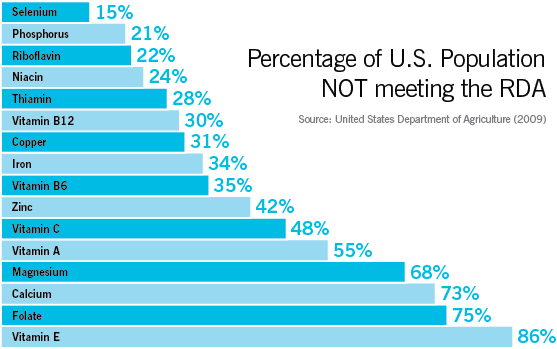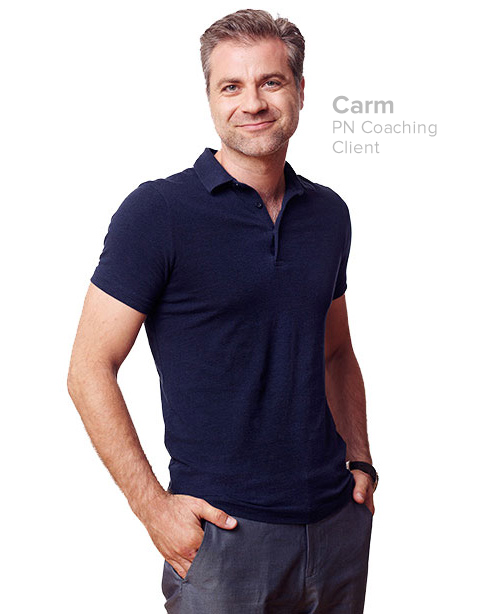Fitness and nutrition professionals often say that to get in shape, you have to treat food as “fuel.” We disagree. Here’s why.
++
Something’s been bothering us lately. We keep hearing this analogy:
“Food is fuel.” You know, like gasoline.
And we keep hearing:
“The human body is like a high-performance race car.” You know, like a Ferrari.
So, you have to get enough fuel to run your car. Without getting too much, of course. Or else the Ferrari — uh, you — will get fat.
You also have to choose only really high-quality, high-octane, and expensive fuel. Or else the Ferrari — oh, right, you again — will gunk up and break down.
We’ve heard this analogy — this story — repeated over and over again. Ad nauseam.
And we think that’s a real problem.
The food story: What’s yours?
Just the other day, on Facebook, we posted this:
Food is ________.
Of the wildly varied, and often interesting, responses, “fuel” appeared 33% of the time.
That’s when it really hit home: For most people, particularly fitness people, “fuel” is the only story they can tell about food.
That worries us.
Food is so much more than “fuel” or “energy” or “calories”.
For one thing, even if we’re looking at food purely in terms of its physiological effects, when we focus on “energy” and “calories”, we’re only telling part of the story.
Sure, the macronutrients (proteins, carbohydrates, and fats) in food contain “energy” or “calories”. Or, perhaps most correctly, “chemical bonds that, when broken, are used to create ATP”.
But food also includes micronutrients, phytochemicals, zoochemicals, water, and more.
Think of these as character actors in a movie. They may not be the “stars” of the show. They don’t really provide “energy” (or fuel) at all.
Yet their dynamic interactions create the spark. They’re absolutely critical for energy, performance, mood, and optimal long-term health. In other words, without them, the show won’t go on.
Unfortunately, the “food as fuel” story almost completely ignores these important characters. So let’s briefly talk about them here.
Micronutrients: Vitamins and minerals
We need vitamins and minerals in our diet. Without them, our bodies break down.
For example, calcium helps:
- build bones,
- clot blood,
- regulate blood pressure,
- keep our muscles and heart pumping, and
- maintain cell communication.
Magnesium plays a role in more than 300 enzyme systems and helps with:
- protein synthesis,
- muscle and nerve function,
- blood sugar control,
- blood pressure regulation,
- energy production, and
- transport of other minerals.
Folate (vitamin B9) helps:
- convert food into energy,
- the nervous system (including the brain) function,
- tissues grow
- red blood cell production.
We could go on all day here.
The bottom line: None of these nutrients provide “fuel.” Which means that the “food as fuel” story totally ignores them.
This may be one reason why vitamin and mineral deficiencies are extremely common. When we only think of food as fuel, it’s easy to forget that we’re eating for other reasons too.

When you’re missing key vitamins and minerals, your body doesn’t work properly. You feel rotten. And you get sick. And that’s true no matter how much fuel is in the Ferarri.
Phytochemicals
Now let’s meet the phytochemicals.
This is a really big grouping of nutrients (phyto = plant) that definitely affects your health.
There are several major categories, including:
- flavonoids,
- phenolic acids, and
- stilbenes/lignans.
The flavonoid category, for example, includes many of the most well-known phytochemicals like:
- anthocyanins and anthocyanidins (found in berries and grapes),
- isoflavones (found in soy foods), and
- catechins (found in tea).
These nutrients have been shown to:
- offer DNA protection against free radicals,
- protect against cancer,
- decrease risk of heart disease, and
- reduce overall mortality.
Here are some other phytochemicals and their benefits.
| Food | Phytochemical | Possible benefit |
|---|---|---|
| Soy (beans, milk, tofu, natto) | Isoflavones (genistein and daidzein) | Reduces blood pressure and increases vessel dilation |
| Red/purple foods (such as colorful berries, red/purple grapes, purple cabbage) | Anthocyanins | Improves vision, inhibits nitric oxide production, induces apoptosis, decreases platelet aggregation, and has neuroprotective effects |
| Grapes & grape products (red wine, grape juice & extracts); cocoa | Proanthocyanidins and flavan-3-ols | Inhibits LDL oxidation, cellular oxygenases, and proinflammatory responses in the arterial wall |
| Garlic, onions, leeks, olives, scallions | Sulfides, thiols | Decreases LDL cholesterol |
| Colorful fruits and vegetables (such as yellow squash, tomatoes & tomato products, leafy greens, watermelon) | Carotenoids such as lycopene, beta-carotenes | Neutralizes free radicals that cause cell damage |
| Broccoli and other cruciferous vegetables (such as kale, cabbage and cauliflower) | Isothiocyanates (sulforaphane) | Neutralizes free radicals that cause cell damage; protects against some cancers; helps balance some hormones |
Source: http://nutrition.ucdavis.edu/content/infosheets/fact-pro-phytochemical.pdf
Of course, like the micronutrients, phytochemicals don’t provide “fuel”. Which means that the “food as fuel” story totally ignores them too.
Zoochemicals
Zoochemicals are like the animal cousins of phytochemicals.
Present in animal foods (zōon = animal), these nutrients have profound health effects.
Here are just a few zoochemicals and their benefits:
| Food | Zoochemical | Possible benefit |
|---|---|---|
| Cold water fatty fish & fish oil (salmon, tuna, herring, mackerel, trout) | EPA (eicosapentaenoic acid) | Reduces inflammation & blood clotting; protects against heart disease; may reduce the risk of irregular heartbeat, type 2 diabetes, cancer, & Alzheimer’s disease |
| Cold water fatty fish, fortified milk and eggs, grass-fed animals, fish oil | DHA (docosahexaenoic acid) | Reduces disorders such as schizophrenia, depression and attention deficit; vital for brain and eye development; may ease discomfort from rheumatoid arthritis |
| Meat and dairy products (especially grass-fed versions) | CLA (conjugated linoleic acid) | Suppresses cancer cell development; may help reduce risk of heart disease; boosts immune system; builds lean muscles; reduces body fat |
| Egg yolks | Lutein & zeaxanthin | Protects against macular degeneration and cataracts; shields the eyes from harmful blue light; improves eye health |
| Beef, pork, herring, salmon, tuna | Creatine | Replenishes ATP to provide cellular energy and support; benefits muscle, brain, bone and liver health |
| Beef, poultry, pork, milk, eggs | Carnosine | Antioxidant that scavenges alpha-beta unsaturated aldehydes formed from peroxidation of cell membranes; opposes glycation; inhibits diabetic nephropathy |
Note: Many zoochemicals are fat-soluble, which means they’re present in animal fats. That’s why avoiding (or limiting) animal fat intake will also limit zoochemical intake.
Like phytonutrients, zoochemicals don’t provide “fuel”. Which means that the “food as fuel” story leaves them out, too.
Food is so much more than fuel. And you’re so much more than a Ferrari.
Okay, so here’s the thing: Living organisms are not machines.
Rather, they’re incredibly complex, self-regulating, and dynamically steering. Frankly, they’re almost magical systems.
If you’ve spent any time doing “calorie math”, you’ll know that trying to calculate precise inputs and outputs is frustrating.
Perhaps you ate more calories than you thought you should… but got leaner.
Or you ate fewer calories than you thought you should… and gained weight. (Or you didn’t lose that last stubborn 10 pounds.)
Or you started eating breakfast instead of skipping it… and dropped a couple of inches off your waistline.
According to the simplistic “food as fuel” view, none of this should be possible. Yet it happens all the time.
Because human bodies aren’t combustion engines. They’re complex, dynamic, organic, and infinitely sensitive systems.
More like the complete cast (and director, and producer) of a fantastic movie than they are like a car. Even a fancy car, like a Ferrari.
For example: Research now shows that all food isn’t created equal, and what we eat isn’t necessarily what we absorb.
Dozens — maybe even hundreds — of factors affect how we digest, process, and use the food we eat.
This means that the fuel, or calorie, value of food outside the body isn’t necessarily the same as the value inside the body. (For more on this, see The best calorie control guide. [Infographic].)
Our bodies have their own priorities. For instance, the body will extract nutrients to keep you alive by any means necessary, often making tough compromises along the way.
This would be sort of like the Ferrari suddenly driving itself to the gas station and holding up the cashier until it gets what it needs, or cannibalizing its own headlights for fuel.
What’s more, your body isn’t even completely “human”.
Much of our digestion and nutrient extraction is done by the trillions of microbial critters living in and on us.
Analysis of our bacterial environments shows that each of us has an individual gut flora “microbiome”, like a fingerprint. Changing our microbiome changes our digestion and absorption, and hence our body composition and health.
We’re incredibly complicated, self-organizing, agenda-driven, only-sorta-human systems.
Frankly, the Ferrari should be jealous.
Food is… information.
So if “food as fuel” story is limited, unimaginative, and — ultimately — incorrect, what is food?
Food is — in part — information.
Sort of like a script. It tells the “actors” in our bodies how to perform.
When we eat, we’re really delivering messages.
- Do this.
- Don’t do this.
- Release this hormone.
- Don’t release that one.
- Express this protein.
- Don’t express that one.
We’re essentially sending instructions that kick off a chemical chain letter.
It’s really quite amazing. Each molecule of food contributes to a beautiful cascade of events, sending all kinds of signals throughout our bodies.
Make hormones! Trigger immune cells! Switch genes on and off! Tell the work crew to clean up and the builders to get on standby!
Lights! Camera! Action!
It’s like the biggest, busiest movie set you can imagine. And somehow — unlike many film sets — it runs almost perfectly.
Our bodies process millions of calories and (let’s be scientific about this) zillions of chemical compounds a year, with nearly 100% efficiency. (Just for comparison, gas-powered engines, like our Ferrari, would be happy to hit 30% efficiency.)
Even cooler, our thoughts, feelings, and environment can affect these processes.
If we smell a tasty meal, have a positive or negative thought about food (or anything else), are happy and relaxed or worried and rushing… it affects nutrient processing.
But let’s start by looking at what happens when we actually consume food.
As we eat, our bodies sense incoming nutrients, and send signals to our brain to let it know what is coming in.

Here are just a few examples of the different messages food delivers.
The carb story
When we eat carbohydrates — it doesn’t matter which type — our blood sugar goes up. Almost all carbohydrates — from sugars to starches — are broken down to the same thing: glucose.
Glucose carries the “carbohydrate message” that tells your gut to release molecules like gastric inhibitory polypeptide (GIP) and glucagon-like peptide-1 (GLP-1) and send them to your pancreas.
These molecules then tell your pancreas to release the hormone insulin.
Grabbing the chemical note and running with it, insulin prepares the rest of your body for the glucose that’s about to appear. Muscle, brain, and fat cells open their mailboxes and get ready to take in the glucose delivery.
Your pancreas then releases other stuff — like somatostatin and amylin — to tell your brain that there’s incoming food.
The more messages, and the more they keep coming (i.e. the higher these chemicals rise and/or the longer they stay elevated), the more your brain believes that you’ve had enough food. (Kinda like when you’re drowning in e-mail and want to yell, “Enough!“)
Here, food is information. It’s communication. It’s a set of instructions that you give your body to accomplish amazing things.
Here’s another example.
The protein and fat story
Proteins and fats also spin a good yarn.
When they’re broken down, their “messages” tell the gut to release a hormone called cholecystokinin (CCK).
CCK tells the pancreas to make certain enzymes that help digest the chicken wings now sitting in your small intestine.
But CCK is talkative, so it likes to keep sending messages.
It tells the gallbladder to release bile (which helps with fat digestion and absorption). It tells the brain you’ve had enough to eat.
And while it’s popped in on the brain, CCK stays for a little chat with other neurotransmitter systems in the brain, such as the endocanabinoid system, which is involved in pain management and mood.
Talk amongst yourselves, cells
Digestion is just the story’s introduction. When these digested food compounds reach our cells, oy — the communication racket.
Cells put protein components (peptides and amino acids) to work making hormones, enzymes, structural proteins, and of course, building muscle.
Fat components (triglycerides and free fatty acids) are used to make hormones and become integrated into our cell membranes. They control inflammation pathways.
Carbohydrate components (glucose and fructose) are used to maintain proper hormone status (such as thyroid, testosterone, and leptin to a degree).
These responses are simply for incoming macronutrients.
Micronutrients, phytochemicals and zoochemicals also carry their own messages and communicate other unique information to the body.
- Some tell the body to boost our own natural antioxidant defense systems.
- Others help our antioxidant defense systems do their job.
- Some tell the body to make enzymes that devour cancer.
- Others attack cancer directly.
- Some stick around in our intestines and protect us from damaging compounds.
- Others bind the damaging compounds and carry them out of the body.
Yackity yak yak yak. You can’t shut these chemical communicators up. (And that’s a good thing.)
Food is smart. And so is your body.
Here’s the point: The “food as fuel” story reduces food to gasoline, our bodies to stupid machines, and you to a calorie accountant.
And that’s sad because you’re more than that. Food and your body deserve a lot more recognition and honor.
At PN, the more we learn, research, and coach, the more we’re amazed at the power of food. It’s packed with meaning, information, communication.
Every food decision we make sends a message to our body.
Every food choice is an opportunity to direct, shape, and remake our health. Our body composition. Our performance. Our well-being.
Food is not just about science.
Many of us are physiologists and biochemists at PN. Sure, we look at food through a science lens.
But that’s not our only perspective.
We know, too, that sharing food is a fundamental human act. Breaking bread (or whatever other food is on the table) is part of our history.
Our culture. Our legacy as humans.
Yes, food itself is information. Communication. A story.
But we also have our own stories that we share around and through food.
There’s information we want to communicate to ourselves — and to others — with how we eat. Where we eat. What we eat.
- I’m sophisticated. I’m a “foodie”.
- I’m a thoughtful consumer. I’m a regular at the farmer’s market.
- I’m from Mexico/Italy/Nigeria/Laos/[insert region/origin/ethnicity] and proud.
- I’m the social hub for my big family. Come on over on Sunday for dinner!
- I’m adventurous. I’ll eat anything once. Once, when I was traveling, I ate…
- I’m careful with my choices. I avoid processed food.
- I’m low maintenance; my fridge is empty. Let’s grab something on the go.
- I’m a bon vivant. I love eating at fancy restaurants.
- I’m a caregiver. I love you. So I cook for you.
And so on.
This is essential information about ourselves, about our family and friends, and about our clients. It’s relevant. Crucial. Powerful, life-shaping knowledge.
That’s why, at Precision Nutrition, we aren’t just nutritionists. Or nutrition coaches.
(And we sure aren’t gas station jockeys helping you do the chore of tank-filling.)
We help you learn about — and celebrate — who you are through the lens of food and nutrition.
We help you create new food stories. More inspiring, joyful, and interesting stories. Stories that go beyond “dumping gas in the tank.”
We start with the science. And end with our shared humanity.
Time to create your food story.
So, take a few minutes and consider this question: What is food? For you?
Is it fuel? Is it information? Is it personal freedom? Is it shame? Is it self-esteem?
Then consider this question: What would you like food to be?
We encourage you to think big. Get imaginative. Learn a little more about physiology. Learn a little more about humanity. Discover what makes food one of the greatest stories ever told.
Because, at Precision Nutrition, food is a story. A story of the wonder of evolution and biology. A collective grand epic of our humanity. A chemical story written in molecules, not words.
It’s a story that shapes your daily life, your health, and your function.
Food is fuel? Uh, we don’t think so.
Want help becoming the healthiest, fittest, strongest version of you?
Most people know that regular movement, eating well, sleep, and stress management are important for looking and feeling better. Yet they need help making it work in their busy, sometimes stressful lives.
That's exactly what PN Coaching does.
Over the past the past two decades, we’ve used the Precision Nutrition Coaching method to help over 150,000 clients lose fat, get stronger, and improve their physical and mental health… for the long-term… no matter what challenges they’re dealing with.
Our habit-based approach is backed by peer-reviewed research, trusted by professional athletes and elite sports teams, and has been taught to more than 175,000 health and fitness professionals worldwide through our Level 1 and Level 2 Certification programs.


Share